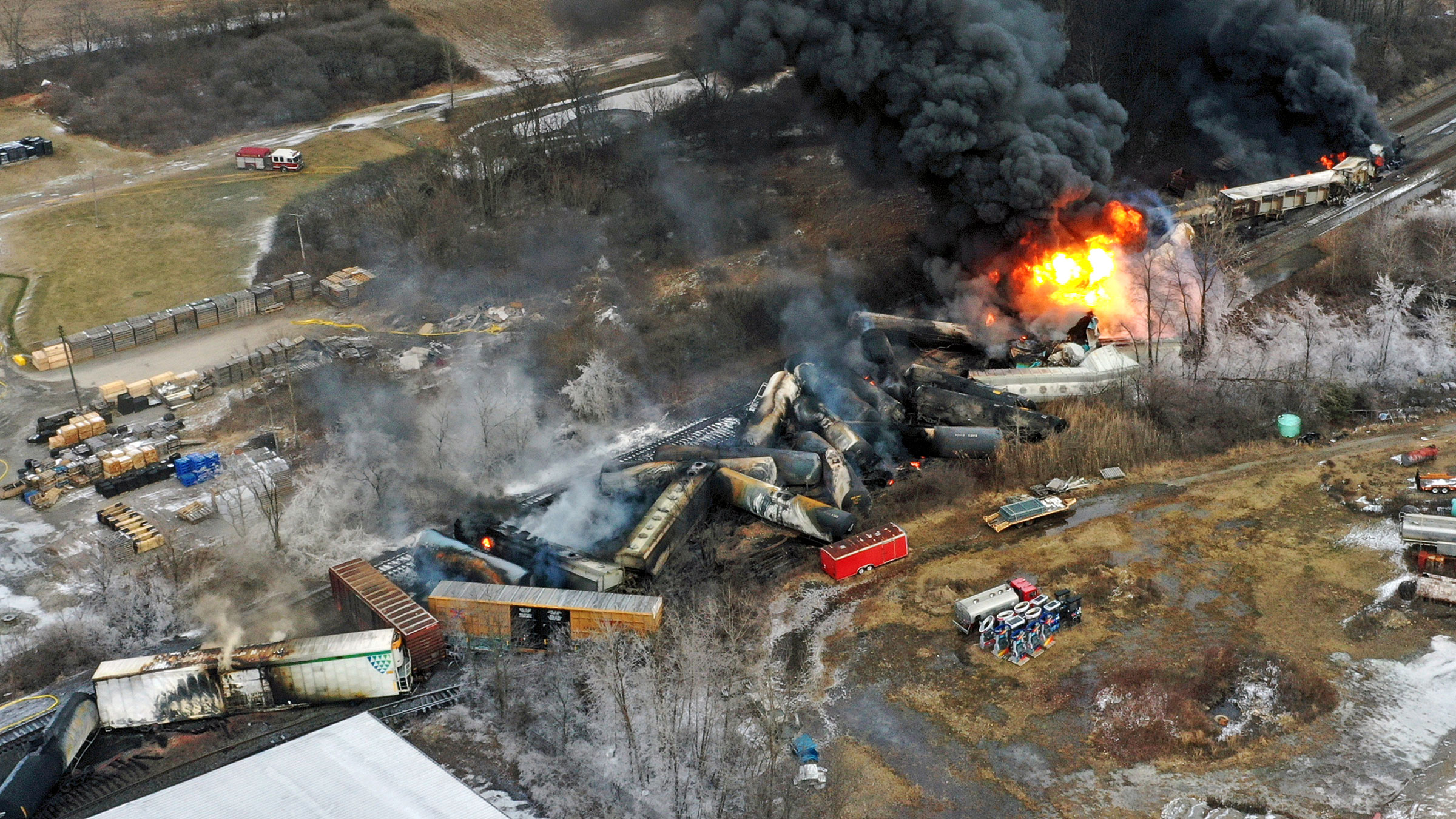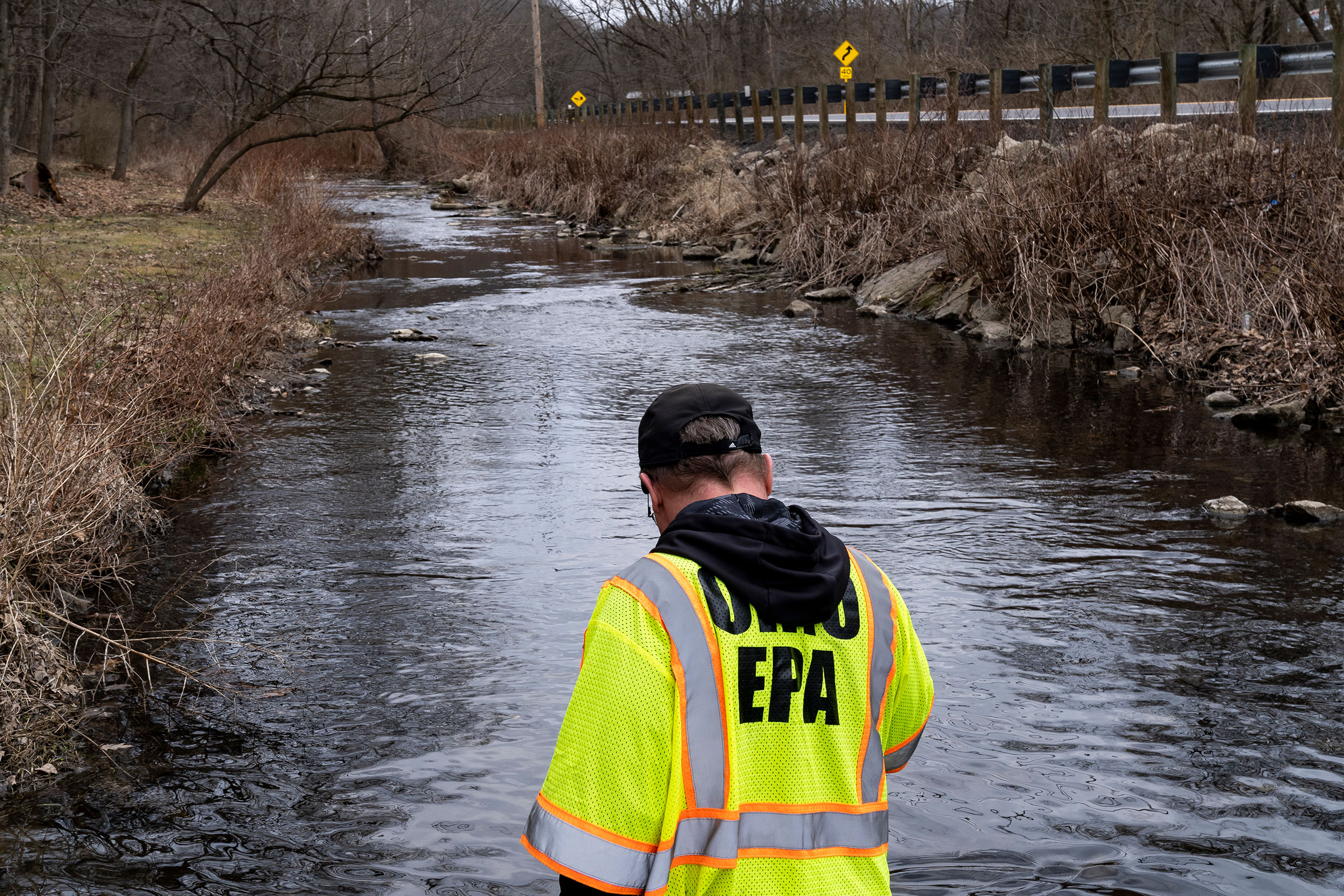As former President Donald Trump prepared to speak on Wednesday in East Palestine, Ohio, where a train derailment on Feb. 3 released toxic chemicals into the atmosphere, he was met by a small crowd of supporters chanting his name.
“You are not forgotten,” Trump said in a speech soon after. “In too many cases, your goodness and perseverance were met with indifference and betrayal.”
After a rocky 2024 campaign launch, Trump used the visit to draw a contrast between himself and President Joe Biden, who has yet to visit East Palestine after the accident. Trump has criticized Biden’s surprise visit to Kyiv in recent days, and ahead of his own visit to Ohio Trump said, “You have a President going to Ukraine and you have people in Ohio that are in desperate need of help.” Trump repeatedly called attention to the fact that Biden hasn’t visited during his remarks on Wednesday.

In the aftermath of the derailment, thousands of fish were found dead and residents reported respiratory and skin issues as a black column of smoke rose over town. But while Trump claimed the Biden Administration has been neglecting the town, Trump’s critics argue that the rail regulations Trump rolled back during his presidency helped set the stage for the disaster in East Palestine.
It’s a friendly political setting for Trump. The Ohio village, an old manufacturing center which sits near the Pennsylvania border, has a population of about 5,000. Ohio voted for Trump by a margin of 8 points in 2020; East Palestine is located in an even deeper red, overwhelmingly white county where nearly 3 in 4 residents backed Trump over Biden, making it a prime location for Trump to deliver his message and attack Biden.
Late last week, Ohio Gov. Mike DeWine announced FEMA would deploy federal resources to the site of the derailment. Biden’s Transportation Secretary Pete Buttigieg announced Wednesday that he will visit the site of the derailment a day after Trump, after facing fierce criticism from members of both parties for being slow to respond to the accident and for his agency’s failure to implement tougher rail regulations beforehand. “A lot of the folks who seem to find political opportunity there are among those who sided with the industry time and time again,” Buttigieg told reporters when asked about Trump’s visit. “They have fought safety regulations on trains and hazmat tooth and nail.” Meanwhile, the Democratic National Committee slammed the former President in a release, saying, “Trump and his Administration made gutting transportation and environmental safety regulations a key priority of their MAGA agenda.”

The Trump Administration reversed a previous rule that would require trains carrying certain hazardous materials to be equipped with electronic pneumatic brakes. According to HuffPost, the rule would not have applied to the train in East Palestine, although better brakes might have reduced the impact of the accident.
The Trump Administration also sided with the rail industry to block a proposed rule that would have required two crew members on every freight train. Experts also noticed an uptick in waivers that exempted rail companies from certain rules, including from some inspections. “It was unprecedented how many of them they asked for and it was also disturbing how quickly they were approved,” says Greg Hynes, the national legislative director of the International Association of Sheet Metal, Air, Rail and Transportation Workers (SMART), a union which assists the National Transportation Safety Board with rail investigations.

According to Hynes and Jared Cassity, SMART’s chief of safety, there were other rollbacks to rail safety during the Trump years. For instance, the time that a train could go without an inspection off air—with its air brake system depressurized—was expanded from 4 hours to 24 hours.
While the NTSB’s investigation on the East Palestine derailment is ongoing, public reports suggest that the derailment was caused by a mechanical issue with an axle—the sort of problem that might be prevented by some of the rail regulations Trump’s Administration slashed. “For me, the lack of frequency in inspections, and the lack of quality of inspections is a very major, major deal and very well could be a contributing factor here,” Cassity says.
More Must-Reads from TIME
- Cybersecurity Experts Are Sounding the Alarm on DOGE
- Meet the 2025 Women of the Year
- The Harsh Truth About Disability Inclusion
- Why Do More Young Adults Have Cancer?
- Colman Domingo Leads With Radical Love
- How to Get Better at Doing Things Alone
- Michelle Zauner Stares Down the Darkness
Write to Mini Racker at mini.racker@time.com